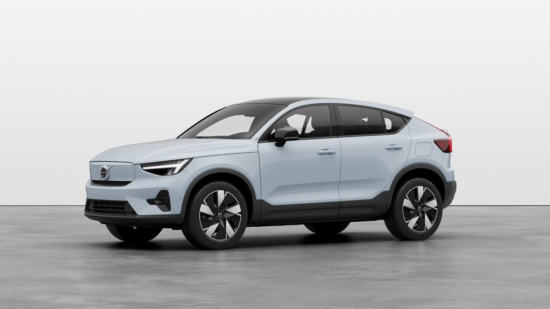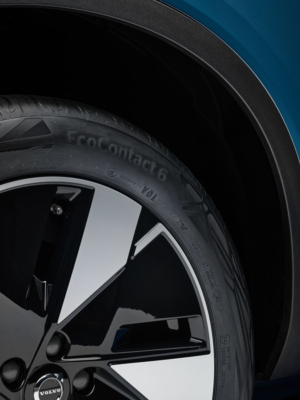Cross-sectionality: Volvo’s XC40 and the intersection of 4×4, SUV and electric vehicle-specific tyres
 All Volvo electric vehicles (such as this XC40) have been fitted with what the Volvo describes as “Recharge” tyres. But what’s a Recharge tyre when it’s at home? (Photo: Volvo)
All Volvo electric vehicles (such as this XC40) have been fitted with what the Volvo describes as “Recharge” tyres. But what’s a Recharge tyre when it’s at home? (Photo: Volvo)
For years the rise in prominence and market share of high-value and high-margin SUV and 4×4 tyres has continued unabated. During that time the boundaries between cross-over vehicles (CUV), sports utility vehicles (SUV) and 4x4s have been well and truly blurred. Now, with electric drivetrain technology coming to the fore as well, and with some tyre manufacturers making the case for specific electric vehicle-orientated tyres, is a new ultra-high value combined niche emerging? And if so, what does such intersectionality, or perhaps more appropriately since we are talking about tyres cross-sectionality, mean for the wider tyres business?
April’s Tyres & Accessories takes a look at the latest developments with SUV and 4×4 products and seeks to answer those questions along the way. The section includes the latest sell-out market data provided by the analysts at GfK as well as details of some of the latest product developments in the market. But we begin with closer look at the example of the Volvo XC40 Recharge, a Swedish-designed electric SUV that exemplifies how the needs of various niches are increasingly overlapping. As we analyse that particular example, the obvious question is: what does the overlapping of specialist SUV tyres and specialist electric vehicle tyres mean for the wider tyre market?
In the middle of last year, Volvo announced the launch of the 2023 model year Volvo XC40 Recharge. The Volvo XC40 Recharge was Volvo’s first-ever fully electric car when it came out in 2020. It is based on the best-selling XC40 compact premium SUV which hit the market three years earlier. The XC40 was the first Volvo model to win the prestigious European Car of the Year award and, according to February 2023’s official figures, it is Volvo’s second-best-selling model overall. With that in mind, it is no surprise to learn that the XC40 has been a regular feature in the top 10 of new registrations in the UK for some time. In other words, the XC40 is both a trendsetter and established in the market – both points that make it a great test case for finding examples of the impact of what might be called crosssectionality in the SUV tyre space.
The XC40 Recharge AWD variant comes with twin electric motors, one on the front axle and one on the rear axle. These are powered by a 78kWh battery that can be fast charged from 10 to 80 per cent in just over 30 minutes, very much on the faster end of the spectrum. And, at the same time, this version has a range-anxiety-busting distance capability of around 438 km. The point is that – from a tyre perspective – the XC40 is an electric SUV with all-wheel-drive (AWD) credentials. In other words, it is a heavier-than-average, AWD-equipped, torquey vehicle – all of which ask more of its tyres. And that, in turn, means the tyres have to be capable of carrying the extra weight and torque of electric SUVs, while offering above-average grip and mileage.
What are “Recharge tyres”?
Speaking of tyres, the all-electric 2023 Volvo XC40 Recharge comes equipped with what Volvo calls “Recharge tyres”. Volvo doesn’t mention which brand or brands it uses for original equipment (OE) supply, but promotional pictures clearly show an XC40’s wheels fitted with Continental EcoContact 6 tyres (see photo). And Continental definitely had OE approval on the conventional 2021 model year XC40.
However, that doesn’t explain the slightly opaque phrase in Volvo’s 2023 XC40 launch literature when the carmaker says its “Recharge tyres” are “for use all year round as standard or optional in Europe.” The year-round language would suggest Volvo is either talking about all-season tyres or, more specifically, the latest generation of what might be called summer-winter all-seasons as opposed to winter-summer all-season tyres. Obvious examples are the Michelin CrossClimate2 and the Continental AllSeasonContact. Clearly, the ContiSportContact 6 isn’t either of those tyres and neither does it fit the “year-round” specification. So, what tyres are fitted?
Recharge tyres are “…the first tyres for year-round use to achieve A-class energy efficiency, an innovation that is in line with the company’s aim to offer more sustainable products.” – Volvo
Volvo’s literature offers this clue when explaining that its Recharge tyres are “…the first tyres for year-round use to achieve A-class energy efficiency, an innovation that is in line with the company’s aim to offer more sustainable products.” As far as we know, the first tyre to achieve both the Three-Peak Mountain Snowflake (3PMSF) winter proficiency sidewall marking and A-rated fuel efficiency on the EU tyre label was the Goodyear Vector 4Seasons Gen-3, which was trailed in February 2020 and officially launched in May 2020.
10 months after that launch, in March 2021, Volvo announced that it would supply Recharge tyres as standard across Northern and Central Europe, but not – at that point at least – in the UK. Prior to that, summer tyres were the standard option for the XC40 Recharge in most Northern and Central Europe markets. The timelines clearly work for the Recharge tyres Volvo mentions to be simply another name for the Goodyear Vector 4Seasons Gen-3.
Promotional pictures clearly show an XC40’s wheels fitted with Continental EcoContact 6, but which manufacturer makes Volvo’s mythical “Recharge” tyres? (Photo: Volvo)
However, the enigmatic “Recharge tyres” bring with them a few other riddles. By mid-November 2021, Volvo – while still not identifying its tyre supplier by name – did reveal that its Recharge cars are equipped with “tyres from recycled and renewable material”. So now we are looking for an A-rolling-resistance-rated, year-round, electric, SUV tyre.
As Volvo explains, “with the internal combustion engine making way for the pure electric powertrain, tyres play an even more important role. Not only are they crucial for safety, they also contribute largely to the vehicle’s battery range. This means tyres for electric cars always have to be on top of technology development.” To put it another way, Volvo is arguing that electric vehicles require specialist electric vehicle tyres.
Shortly afterwards, Volvo dropped another hint relating to a concept car: “the Concept Recharge [range] feature special tyres made by Pirelli, which are completely free from mineral oil and are made from 94 per cent fossil-free materials, including recycled and renewable materials like natural rubber, bio-silica, rayon and bio-resin. This reflects the circular approach shared by Volvo Cars and Pirelli, with a focus on reducing resource consumption and environmental impact.”
The suggestion that Pirelli supplies Volvo’s specialist “Recharge” tyres because the Italian tyremaker is linked to a Concept Recharge product is certainly plausible because a few months later in 2021 Motortrend reported that the XC40 Recharge P8 came on 235/45 R20 Pirelli PZero Elect tyres.
Put that all together and the answer to the question “which tyre manufacturer supplies Volvo’s special Recharge tyres?” is likely to be Continental, Goodyear or Pirelli – or any combination of those three.
That knowledge is, of course, interesting. But it is also of strategic value in terms of what it means for the market. This close-up look at the tyres fitted on one of the most popular SUVs on the market and its arguably pioneering all-electric electric variant reveals that some OEMs are demanding electric vehicle and SUV tyres that are specifically equipped with all-season performance. That flies in the face of the kind of rationale that suggests that quality tyres are quality tyres. And for those that already advocate for particular tyres in particular conditions, the bar has been raised. For the tyre trade too, this kind of approach can only bring with it an increase in complexity along with further proliferation of stock keeping units. However, that complexity also comes with opportunity. If electric vehicle, SUV and all-season tyres all offer good margin opportunities. What kind of value is attached to a tyre that meets all those demands simultaneously?


 Nissan
Nissan

Comments